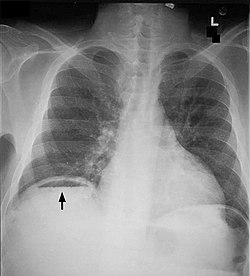Pneumoperitoneum

Editor-In-Chief: Prab R Tumpati, MD
Obesity, Sleep & Internal medicine
Founder, WikiMD Wellnesspedia &
W8MD's medical weight loss NYC, sleep center NYC
Philadelphia medical weight loss and Philadelphia sleep clinics
| Pneumoperitoneum | |
|---|---|

| |
| Synonyms | N/A |
| Pronounce | N/A |
| Specialty | N/A |
| Symptoms | Abdominal pain, distension, dyspnea |
| Complications | Peritonitis, sepsis |
| Onset | Sudden |
| Duration | Variable |
| Types | N/A |
| Causes | Perforated peptic ulcer, trauma, post-surgical |
| Risks | Peptic ulcer disease, abdominal surgery |
| Diagnosis | X-ray, CT scan |
| Differential diagnosis | Pneumatosis intestinalis, subphrenic abscess |
| Prevention | N/A |
| Treatment | Surgical intervention, antibiotics |
| Medication | N/A |
| Prognosis | Depends on underlying cause and treatment |
| Frequency | Common in cases of abdominal trauma or surgery |
| Deaths | N/A |



File:UOTW 68 - Ultrasound of the Week 2.webm Pneumoperitoneum refers to the medical condition characterized by the presence of air or gas in the peritoneal cavity, the space within the abdomen that contains the intestines, stomach, and liver. It is a common finding on radiographs and can be a sign of a serious medical condition, such as a perforated abdominal organ.
Causes[edit]
Pneumoperitoneum is most commonly caused by a perforated abdominal organ. This can occur due to a variety of conditions, including peptic ulcer disease, diverticulitis, and appendicitis. Other causes can include trauma, surgery, and certain medical procedures, such as a colonoscopy or endoscopy.
Diagnosis[edit]
The diagnosis of pneumoperitoneum is typically made through imaging studies. An abdominal X-ray or CT scan can show the presence of air or gas in the peritoneal cavity. In some cases, a physical examination may also reveal signs of pneumoperitoneum, such as abdominal pain, tenderness, or distension.
Treatment[edit]
The treatment for pneumoperitoneum depends on the underlying cause. If it is due to a perforated organ, emergency surgery may be required to repair the damage. In some cases, antibiotics may also be given to prevent or treat infection. If the pneumoperitoneum is due to a medical procedure, it may not require any treatment and may resolve on its own.
See also[edit]
Ad. Transform your life with W8MD's Budget GLP-1 injections from $75


W8MD offers a medical weight loss program to lose weight in Philadelphia. Our physician-supervised medical weight loss provides:
- Weight loss injections in NYC (generic and brand names):
- Zepbound / Mounjaro, Wegovy / Ozempic, Saxenda
- Most insurances accepted or discounted self-pay rates. We will obtain insurance prior authorizations if needed.
- Generic GLP1 weight loss injections from $75 for the starting dose.
- Also offer prescription weight loss medications including Phentermine, Qsymia, Diethylpropion, Contrave etc.
NYC weight loss doctor appointmentsNYC weight loss doctor appointments
Start your NYC weight loss journey today at our NYC medical weight loss and Philadelphia medical weight loss clinics.
- Call 718-946-5500 to lose weight in NYC or for medical weight loss in Philadelphia 215-676-2334.
- Tags:NYC medical weight loss, Philadelphia lose weight Zepbound NYC, Budget GLP1 weight loss injections, Wegovy Philadelphia, Wegovy NYC, Philadelphia medical weight loss, Brookly weight loss and Wegovy NYC
|
WikiMD's Wellness Encyclopedia |
| Let Food Be Thy Medicine Medicine Thy Food - Hippocrates |
Medical Disclaimer: WikiMD is not a substitute for professional medical advice. The information on WikiMD is provided as an information resource only, may be incorrect, outdated or misleading, and is not to be used or relied on for any diagnostic or treatment purposes. Please consult your health care provider before making any healthcare decisions or for guidance about a specific medical condition. WikiMD expressly disclaims responsibility, and shall have no liability, for any damages, loss, injury, or liability whatsoever suffered as a result of your reliance on the information contained in this site. By visiting this site you agree to the foregoing terms and conditions, which may from time to time be changed or supplemented by WikiMD. If you do not agree to the foregoing terms and conditions, you should not enter or use this site. See full disclaimer.
Credits:Most images are courtesy of Wikimedia commons, and templates, categories Wikipedia, licensed under CC BY SA or similar.
Translate this page: - East Asian
中文,
日本,
한국어,
South Asian
हिन्दी,
தமிழ்,
తెలుగు,
Urdu,
ಕನ್ನಡ,
Southeast Asian
Indonesian,
Vietnamese,
Thai,
မြန်မာဘာသာ,
বাংলা
European
español,
Deutsch,
français,
Greek,
português do Brasil,
polski,
română,
русский,
Nederlands,
norsk,
svenska,
suomi,
Italian
Middle Eastern & African
عربى,
Turkish,
Persian,
Hebrew,
Afrikaans,
isiZulu,
Kiswahili,
Other
Bulgarian,
Hungarian,
Czech,
Swedish,
മലയാളം,
मराठी,
ਪੰਜਾਬੀ,
ગુજરાતી,
Portuguese,
Ukrainian


